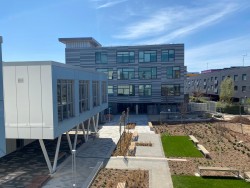Boho 8 – the most recent phase of Middlesbrough’s Boho Zone – is the location for the town’s digital and creative sectors and has seen modular methods transform the area.
Previously a car park, the £2.5million project, supported by the Local Growth Fund from the Tees Valley Mayor and Combined Authority, provides additional space for companies that are rapidly expanding elsewhere on the campus, and is intended to attract new digital and creative businesses to the area. The award-winning concept by Seymour Architecture outlined high-quality facilities and a unique cantilevered design, with buildings ranging from 1,000 to 3,000sq ft. The buildings are complemented by a modern external communal space, with the aim of making it feel like a high street.
From Concept to Completion in Just Eight Weeks
CPC worked closely with Middlesbrough Council and its partner Faithful+Gould through the MB1 Modular Buildings (MB1) framework, resulting in modular specialists M-AR being appointed to deliver the project. The ambitious modular offices project began in August 2020, with construction of 1 the buildings being manufactured at M-AR’s site on the banks of the River Humber in East Yorkshire while the groundworks were being carried out. Just eight weeks later, four office blocks consisting of 18 individual 49m² modules had been completed and quality checked. They were erected over a five-day period.
Amanda Grimbleby, Partnerships and Business Development Director at M-AR, said: “This just demonstrates the speed in which off-site construction can accelerate the delivery of such projects, and this has all been able to happen during the Covid-19 pandemic. The innovative design created by Seymour Architecture will provide light, bright and inspiring office spaces for ambitious and creative digital businesses in the region and being part of making this happen is inspiring in itself.”
Collaboration is Key
The working relationship between Middlesbrough Council, Faithful+Gould, M-AR and CPC contributed to the success of the project. “It’s all about collaborative working and early engagement with the client and appointed company, to show what our Modular Buildings solution can achieve,” said Tony Maw, Technical Support Manager at CPC. Our relationship provided a solid foundation in understanding how each other work, helping us to work in an effective manner to achieve the best quality results. I think Boho 8 is a great example what can be achieved by working side-by-side."
Utilising Procurement Frameworks
Using frameworks for offsite projects
allows relationships between clients
and suppliers to develop and flourish
over a longer-term period and sets out
an integrated supply chain without any
legal problems for procurement teams.
Early engagement between suppliers
and clients through the framework
also ensures the risk load is shared
more widely. Mark Chicken, Quantity
Surveyor at Faithful+Gould, said: “CPC
are very interactive, which is something
you don’t get from most framework
providers. This interaction gives you
confidence in using their services, and
you know there is always someone
there to talk to for advice.”
The latest iteration of the framework, Modular Buildings (MB2), was launched in June 2021 and allows local authorities, social landlords and other public bodies to source preapproved specialist suppliers who can design, supply and install permanent, temporary, and refurbished modular buildings. The MB2 framework can be used by local authorities across the UK through LHC’s regional hubs – LHC London and South East, SPA, WPA, SWPA and CPC – and will run until May 2025.
LHC FRAMEWORK AGREEMENT FOR MODULAR BUILDINGS
The LHC Framework Agreement for Modular Buildings (design, manufacture, supply and installation) is available to public sector organisations in England, Scotland and Wales and forms one of the LHC Construction, Extension and Refurbishment portfolio.
Fully OJEU compliant, the Modular Buildings Framework provides public sector organisations with easy access to offsite manufactured, volumetric and panelised building systems for the use in non-residential buildings and residential projects where they are of mixed-use development or for student accommodation for schools and universities.
For more information visit: www.lhc.gov.uk/frameworks/construction-extension-and-refurbishment/modular-buildings-mb2
Read the full article, go to Offsite Magazine









